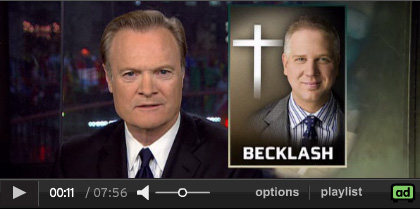Christians
Given Glenn Beck's threat that "the hammer is coming," I have been keeping my eyes and ears open to see and hear what attacks he might next make on us or the growing movement of Christians who share with us the call to
Glenn Beck says Christians should leave churches that use the word "social justice." He says social justice is a code word for communism and Nazism.
In case you haven't already seen this, it's been discovered that gunsights on weapons used by British and American forces in Iraq and Afghanistan are inscribed with coded biblical references, including:
As some of you know (though I know not many of you keep up with the latest men's magazines) -- Esquire magazine's end of the year "Best and Brightest" edition named me one of the "Radicals and Rebels Who Are Changing the World"... but I wanted you to know the story behind the hype.
